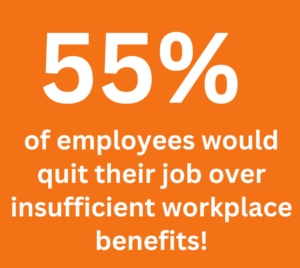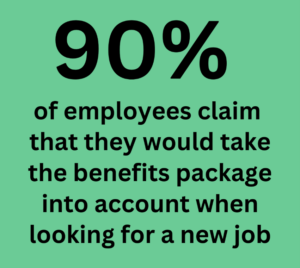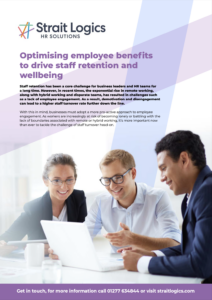
Future-proofing your workplace through flexibility: the true value of flexible benefits
In today’s fast-paced, ever-evolving workplace, HR managers are under increasing pressure to foster a work environment that not only attracts top talent but also retains it for the long term.

One 2022 study, which surveyed 2,000 workers in the UK and Ireland, revealed that 55% of employees would quit their job over insufficient workplace benefits. That means, if employers want to attract the right talent, and keep hold of their staff, building and offering the right employee benefits packages is a key component.
In an era where one-size-fits-all solutions no longer meet the diverse needs of the modern workforce, it’s time for businesses to embrace more flexible employee benefits.
What are flexible benefits?
Flexible workplace benefits are a selection of employee perks offered as tailored, customisable benefits packages, allowing employees to choose the options that suit their individual needs and preferences. These may include (but are not limited to) options such as:
- Additional pension contributions
- Buying and selling annual leave
- Healthcare plans
- Insurance products
- Vehicle breakdown cover
By offering a range of choices, companies can better accommodate diverse lifestyles and workers at different life stages, enhancing employee satisfaction and work-life balance.
Offering a wide range of benefits takes some time, and you might want to think about implementing a comprehensive benefits strategy, to ensure you’re offering your workers the right rewards. But is it worth putting in the hours to give your workforce back the control over their workplace perks?
The answer is a resounding YES, and here are our top six reasons why:
1. Catering to a diverse workforce
The modern workforce is more diverse than ever before, with employees spanning different generations, lifestyles, and backgrounds. What motivates a young graduate may differ vastly from what appeals to a parent or someone nearing retirement. Flexible benefits allow employees to tailor their package to suit their unique needs and preferences, whether that’s additional pension contributions, buying/selling annual leave, or even wellness programmes.
By offering flexibility, HR managers can ensure that each employee feels valued and supported, fostering a culture of inclusion and respect for individuality.
2. Enhancing employee satisfaction and retention
Studies consistently show that employees who feel their employer cares about their well-being are more likely to stay with the company longer. Flexible benefits empower employees to take control of their personal and financial well-being, which in turn leads to higher job satisfaction.
When employees can select benefits that directly enhance their quality of life, they are more engaged, motivated, and loyal to the company. This helps reduce staff turnover rates, which, in turn, means you avoid the associated costs of recruiting and training new staff.
3. Attracting top talent

90% claim that they would take the benefits package into account when looking for a new job. In a competitive job market, a standout benefits package can be a significant factor in attra
cting high-calibre candidates. Offering flexible benefits demonstrates that a company is forward-thinking, employee-focused, and adaptive.
Great candidates will be drawn to a company that values work-life balance and offers the freedom to choose benefits that matter most to them. This can give employers a competitive edge when hiring for key positions.
4. Supporting wellbeing and work-life balance
Mental health and wellbeing are increasingly at the forefront of workplace conversations, and for good reason. Whilst an Employee Assistance Programme (EAP) can be offered as standard, offering flexible benefits such as gym memberships, or flexible working hours can significantly improve employees’ physical and mental wellbeing.
A healthy work-life balance not only enhances productivity but also reduces the chance of absenteeism due to stress or burnout. By allowing employees to choose benefits that support their health and personal lives, HR managers can help cultivate a more resilient, happier workforce.
5. Cost-effective for employers
It’s a common misconception that offering flexible benefits is more costly for employers. In reality, a well-designed flexible benefits scheme can be more cost-effective (and sometimes tax-efficient) than offering a standardised package. Instead of providing benefits that may go unused, companies can allocate budgets more efficiently by allowing employees to select options that they will actually use and appreciate.
Additionally, flexible benefits can be adjusted based on company resources, ensuring that both the employer and employees get to see the value.
6. Future-proofing the workplace
The future of the workplace is undoubtedly moving towards flexibility, not just in terms of working hours and location, but also in the way rewards are offered. With the rise of remote work, hybrid work and the gig economy, employees expect greater freedom to customise their work life.
By implementing flexible benefits now, HR managers can future-proof their organisations, ensuring they stay ahead of trends and continue to meet employee expectations in a changing workplace landscape.
Flexible benefits: Is it really worth it?

In short, offering flexible employee benefits is not just a perk for your workforce – it’s a strategic move that can boost satisfaction, retention, and attraction of talent, while supporting the overall longevity of the workforce. The initial effort to implement a flexible benefits scheme pays off through increased loyalty, enhanced productivity, and long-term cost savings.
As the workplace continues to evolve, offering flexibility in employee benefits is no longer a luxury, but a necessity for companies looking to thrive in today’s competitive environment. For HR managers, it’s a smart investment in both the present and future success of their teams.
Strait Logics provides the platform to make offering flexible benefits easier than ever. Our solution allows HR teams to seamlessly manage and communicate flexible benefits packages, ensuring employees get the personalised rewards they value most. Offering flexible benefits in tandem with a Total Rewards solution could help you to build a more powerful, more transparent employee benefits strategy and give a full view of the employee value proposition.
Check out our recent blog, total rewards and how to get them right, to learn more about how your employees and your business could thrive by attracting, motivating and ultimately retaining the right talent. Or simply get in touch to request a demo our platform, Rewards Portal.

